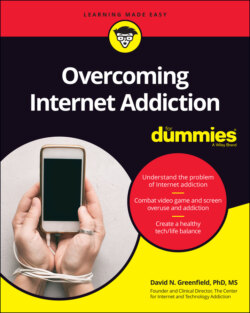Читать книгу Overcoming Internet Addiction For Dummies - David N. Greenfield - Страница 77
THE FIRST LARGE-SCALE STUDY OF INTERNET ADDICTION — AND WHAT HAPPENED NEXT
ОглавлениеI worked my way through 12 years of college and professional training as an electronics technician, and I always had an affinity for science and electronics, so computers and the Internet fit right in. I believe it was this coalescence between my interest in electronics, addiction medicine, and human sexual behavior that offered a perfect combination for my newly developing specialty in Internet and technology addiction.
In the earlier days of the Internet, I collaborated with a colleague, Dr. Alvin Cooper, on some articles and publications on the interaction between the Internet and sexual behavior. Dr. Cooper was an early pioneer in research on the addictive nature of the Internet as well as Internet sexuality. Around this time, I read a paper written by the late Dr. Kimberly Young, who published the results of a small pilot study comparing Internet addiction to pathological gambling (the medical diagnostic term for gambling addiction). In her study, she identified several factors that seemed to play a role in the addictive nature of the Internet. I was intrigued, and shortly after, I embarked on a partnership with ABC News to develop and publish the results of the first large-scale study on Internet addiction.
Research in psychiatry and behavioral science is an arduous process and involves attracting subjects to study, so we decided to develop a broad and statistically sound survey that would be posted online for people to complete and that would give us an idea of what they were doing and experiencing online. There are, of course, limitations to a self-selected and self-reported study, but it was a first step. So, in 1997 the study finally went up on the ABC News servers, and in less than two weeks, we had over 18,000 responses. Some subjects were thrown out, but even with these rejections, this was an unheard-of response and gave us thousands of lines of data to look at, thus beginning an entirely new subspecialty of behavioral addiction medicine for me. I often tell doctors and clinicians whom I train that my specialty sort of found me, as opposed to me choosing it.
It took months to analyze the data, which led to a journal publication and resulted in my 1999 book entitled Virtual Addiction. At the time of my research, only one book had been published on the subject and there was almost no research; today, there are hundreds of books on the subject, and you can find nearly a thousand research studies and clinical papers on it. In short, we know a lot more about the Internet than we did in the mid-1990s.
The result of my original research (which has since been supported) is that yes, the Internet and the portals through which we consume it are clearly addictive. It is well accepted that Internet addiction and video game addiction are legitimate diagnoses, which, in 2019, led the World Health Organization (WHO) to declare Gaming Disorder an official medical diagnosis to be included in its upcoming ICD-11 (International Classification of Diseases, 11th revision), which is the leading manual for all medical diagnoses used in healthcare.
What time distortion tells us is that the Internet digital drug is powerful and can alter our perceptions. The reason for this appears to be, in part, that the Internet and screens hyper-focus our attention while interactively distracting us — while transmitting stimulating and intoxicating content at the same time. When you couple all of this with variable rewards, you can see how a person can become stuck online and get lost in cyberspace.
Digital drug delivery is very similar to the way drugs are consumed and metabolized in our bodies. The shorter the time between introducing an intoxicating drug or behavior into our nervous system and subsequent intoxication, the more addictive that drug or behavior is. This is because our nervous system is very responsive to the brevity of time between stimulation and intoxication — in essence, this is classical conditioning. The shorter the time that passes between when you click and then see, find, or play something online that is desirable to you, the more addictive potential it has. This speed factor likely means there are potential negative implications to faster processor speeds and high-speed Internet access connections — in this sense, faster may not always be better.
